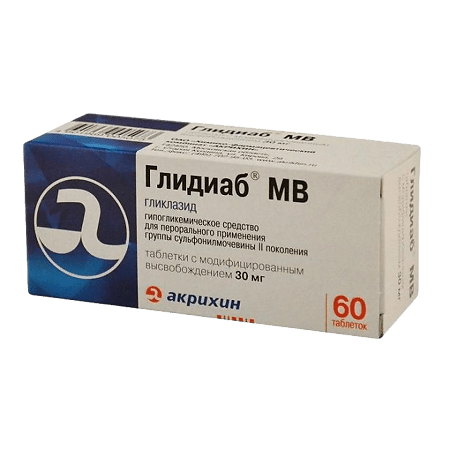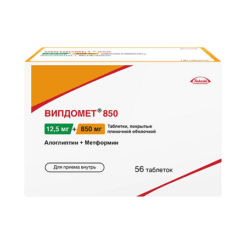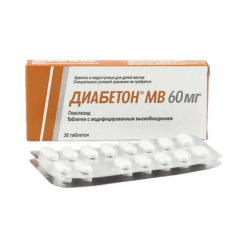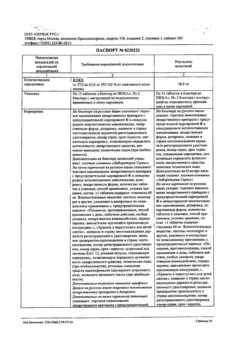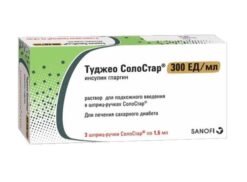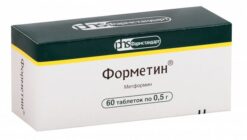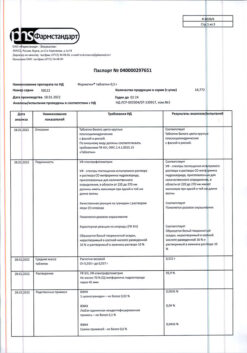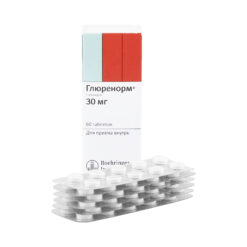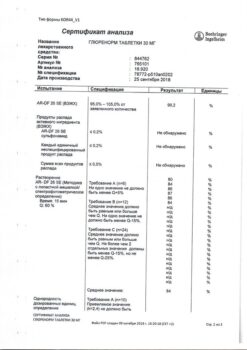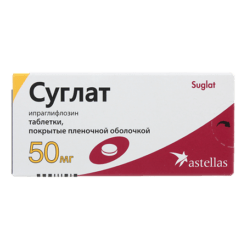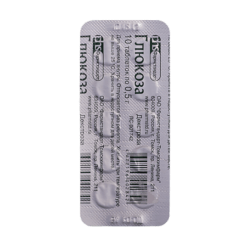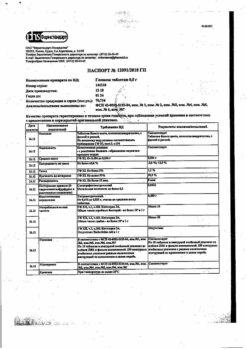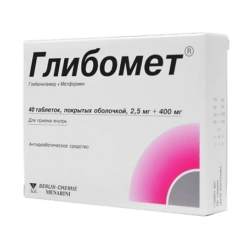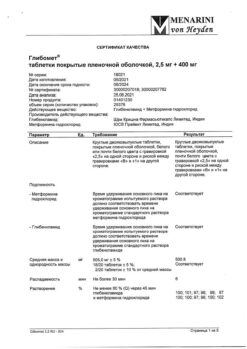No products in the cart.
Glidib MB, 30 mg 60 pcs
€4.23 €3.52
Description
Glediab MB is a hypoglycemic drug, a sulfonylurea derivative of II generation. Glidiab stimulates insulin secretion by the pancreas, potentiates insulin-secretory action of glucose, increases the sensitivity of peripheral tissues to insulin.
Stimulates the activity of intracellular enzymes of muscle glycogen synthetase.
Limits the period of time from the moment of eating to the beginning of insulin secretion. Glidiab restores the early peak of insulin secretion (unlike other sulfonylurea derivatives, such as glibenclamide and chlorpropamide, which act primarily during the second phase of secretion).
Limits the peak of hyperglycemia after a meal.
Indications
Indications
Active ingredient
Active ingredient
Composition
Composition
1 tablet contains:
the active ingredient:
Glicliquid 30 mg.
Auxiliary substances:
Hypromellose – 44 mg,
Microcrystalline cellulose – 123 mg,
How to take, the dosage
How to take, the dosage
The dose of the drug should be adjusted individually depending on clinical manifestations of the disease, glucose levels on an empty stomach and 2 hours after meals.
The initial daily dose (including for elderly patients over 65 years of age) is 30 mg (1 tablet). Further, if necessary, the dose of the drug is increased at intervals of at least 2 weeks. Maximal daily dose is 120 mg (4 tablets). The drug is taken orally once in the morning with breakfast.
Glidyab® MB can be used in combination with other hypoglycemic drugs: biguanides, alpha-glucosidase inhibitors or insulin.
Patients with mild to moderate renal dysfunction (CK of 15 to 80 ml/min) should use the drug in the same dosages.
Interaction
Interaction
The hypoglycemic effect of the drug is increased with concomitant use with ACE inhibitors, histamine H2-receptor blockers (cimetidine), antifungal drugs (miconazole, fluconazole), NSAIDs (phenylbutazone, indomethacin, diclofenac), fibrates (clofibrate, besafibrate), anti-tuberculosis drugs (etionamide), salicylates, indirect coumarin anticoagulants, anabolic steroids, Beta-adrenoblockers, cyclophosphamide, chloramphenicol, MAO inhibitors, prolonged sulfonamides, with phenfluramine, fluoxetine, pentoxifylline, guanethidine, theophylline, with drugs blocking tubule secretion, with reserpine, bromocriptine, disopyramide, pyridoxine, allopurinol, ethanol and ethanol-containing drugs, and other hypoglycemic drugs (acarbose, biguanides, insulin).
The hypoglycemic effect of the drug is decreased when concomitant use with barbiturates, GCS, sympathomimetics (epinephrine, clonidine, ritodrine, salbutamol, terbutaline), with phenytoin, slow calcium channel blockers, carboanhydrase inhibitors (acetazolamide), thiazide diuretics, chlorothalidone, furosemide, triamtaren, asparaginase, baclofen, danazol, diazoxide, isoniazid, morphine, glucagon, rifampicin, with thyroid hormones, with lithium preparations, with nicotinic acid in high doses, with chlorpromazine, estrogens and oral contraceptives containing them. When interacting with ethanol, a disulfiram-like reaction may develop. Gliclazide increases the risk of ventricular extrasystole with cardiac glycosides. Beta-adrenoblockers, clonidine, reserpine, guanethidine can mask clinical manifestations of hypoglycemia.
Special Instructions
Special Instructions
Treatment is carried out on a low-calorie, low-carbohydrate diet. It is necessary to monitor the blood glucose level on an empty stomach and after meals, the daily curve of blood glucose level and urine. In case of physical and emotional stress and changes in diet it is necessary to correct the dose.
Contraindications
Contraindications
Contraindications to use of GLIDIAB® MB
Side effects
Side effects
Gastrointestinal organs: very rare – dyspeptic complaints (nausea, vomiting, abdominal pain), very rare – jaundice.
Cardiovascular system and blood: reversible cytopenia, eosinophilia, anemia.
Skin disorders: rare – skin allergic reactions, photosensitization.
Metabolism disorders: hypoglycemia.
Nervous system and sensory system disorders: weakness, headache, dizziness, change in sense of taste.
Overdose
Overdose
Symptoms: hypoglycemia is possible, up to hypoglycemic coma.
Treatment: if the patient is conscious – ingest easily digestible carbohydrates (sugar), in loss of consciousness – intravenous injection of 40% dextrose solution (glucose), intravenous injection of 1-2 mg of glucagon. After recovery of consciousness, the patient should be given a meal rich in easily digestible carbohydrates to avoid the recurrence of hypoglycemia.
Pregnancy use
Pregnancy use
The drug is contraindicated in pregnancy and during lactation (breastfeeding).
Similarities
Similarities
Additional information
| Weight | 0.027 kg |
|---|---|
| Shelf life | 2 years |
| Conditions of storage | In a dry, light-protected place at a temperature not exceeding 25 °C |
| Manufacturer | Akrihin HFC JSC, Russia |
| Medication form | controlled release tablets |
| Brand | Akrihin HFC JSC |
Related products
Buy Glidib MB, 30 mg 60 pcs with delivery to USA, UK, Europe and over 120 other countries.

